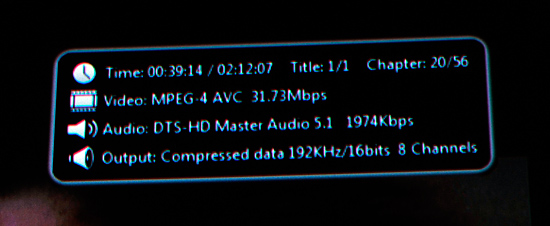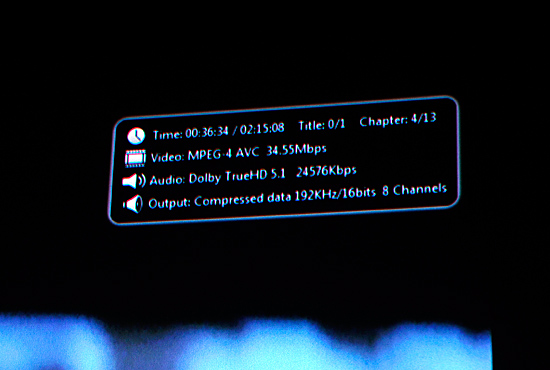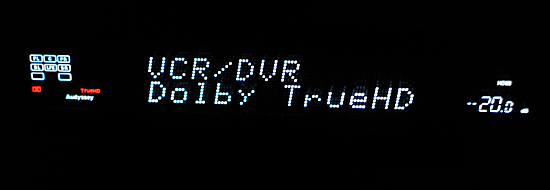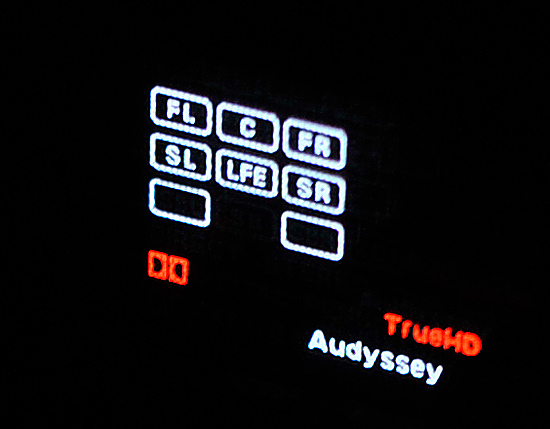Auzentech HomeTheater HD Preview: Bitstreaming True HD/DTS-HD MA
by Anand Lal Shimpi on September 2, 2009 12:00 AM EST- Posted in
- GPUs
The First Attempt: Failure
This was the email I sent Auzentech after spending a full day with the card trying to get it to work:
I've been working with the Auzen Z-Fi HomeTheater HD card for most of the past 24 hours and thus far I have not been able to get it to reliably work in the vast majority of situations. Here's what I've tried:
Under Windows 7 x64
1) On a Zotac GeForce 9300 motherboard with integrated graphics I get no video output from the Auzen card on my Westinghouse LVM-42w2 42" LCD.
2) On an Intel P55 motherboard with GeForce GTX 280 graphics card I get no video output from the Auzen card on my Westinghouse LVM-42w2 42" LCD.
3) On a Zotac GeForce 9300 motherboard with integrated graphics I get no video output from the Auzen card in my home theater setup: Integra DTC-9.8 preprocessor + JVC RS2 projector.Under Windows Vista 32-bit:
1) On an Intel P55 motherboard with GeForce GTX 280 graphics card I am limited to 720p output from the Auzen card on my Westinghouse LVM-42w2 42" LCD. Selecting 1080p simply produces no-signal on the Westinghouse.
2) On an Intel P55 motherboard with GeForce GTX 280 graphics card I get no video output from the Auzen card in my home theater setup: Integra DTC-9.8 preprocessor + JVC RS2 projector.
3) On an Intel P55 motherboard with GeForce GTX 280 graphics card I get no video output from the Auzen card in my secondary home theater setup: Onkyo TX-SR806 receiver + Samsung 50" TV.
4) On an Intel P55 motherboard with GeForce GTX 280 graphics card I get no video output from the Auzen card on my Toshiba 42" Regza LCD TV.In all cases I confirmed that both the LED lights (HDMI in and HDMI out) were illuminated. I tried both an HDMI cable from the GPU to the Auzen card as well as DVI-to-HDMI from the GPU to the Auzen card, neither worked. I even tried the internal HDMI passthrough jumper on the NVIDIA chipset to no avail. I used the drivers off of the CD that came with the card and then installed the updated drivers you sent Gary.
I was ready to give up on it. I went to bed, finished up The SSD Relapse the next day and tried one last thing before I gave up on it again: switch to a non-NVIDIA card.
The one thing both of my test platforms had in common was their NVIDIA graphics using the latest 190 series drivers. I swapped an ATI Radeon HD 4890 into the P55 board, installed its drivers and it worked right away; under both Windows Vista 32-bit and Windows 7 x64.
I’m not sure what the NVIDIA/Auzen incompatibility was, and perhaps switching to an arbitrary older driver would fix it but with a working setup I wasn’t about to try and figure it out. For what it’s worth, the NVIDIA/Auzentech combo did work perfectly on my Dell WFP3008 30” display; too bad it doesn’t have a built in receiver to make that useful.
The Second Attempt: Success
With an AMD GPU on the P55 board everything worked perfectly; I took the system sans case down to my theater, hooked it up and threw on a couple of BDs. I hadn’t seen Die Hard in a while and it has a DTS-HD MA track, so I popped that in to verify that it was working.

There are some UI bugs with the PowerDVD 9 control panel that enables bitstreaming these codecs. You basically have to select your audio output settings twice to get it to work; change your audio output once to something other than bitstreaming then once more to bitstreaming (Non-decoded high-definition audio to external device) to make it work.
Once playing, the thing worked as advertised:

Update: As readers have correctly pointed out it looks like PowerDVD is reporting its output incorrectly, but the card is functioning as intended here. It would be impossible to down-sample the compressed True HD/DTS-HD MA streams without decoding them. It also looks like the audio bitrate in The Hunt for Red October is being incorrectly reported.
Next up we have a Blu-ray of The Hunt for Red October, this time a TrueHD disc:













76 Comments
View All Comments
hu24ebr - Wednesday, September 2, 2009 - link
I already have a slim ps3, and a home theater receiver that can bit stream, i tried to compare between the compressed and the pure audio, and I have failed to listen to any difference.cmdrdredd - Wednesday, September 2, 2009 - link
[quote]I already have a slim ps3, and a home theater receiver that can bit stream, i tried to compare between the compressed and the pure audio, and I have failed to listen to any difference.[/quote]That's because there is no difference.
Golgatha - Wednesday, September 2, 2009 - link
Yeah, I thought about getting all excited about HD audio, but my ears just can't tell the difference. I have a 5.1 Klipsch setup too, so my speakers aren't super high end, but they aren't crap either.I figured an upgrade to PowerDVD 9 was $50, a sound card that can pass the HDMI HD audio signals would be $200+, and then I get to pray to God it all works when I get it together...or, I could just keep what I have and live with HD audio sources downsampled to DD5.1 and live with it. This and the fact that later versions of the PowerDVD 8 software don't support playing HD audio/video back from a virtual drive pretty much killed any and all desire to upgrade my hardware.
Frankly, they have only succeeded making me not want to purchase hardware and software to playback Blu-ray discs with all this DRM in the mix. If things like AnyDVD HD weren't available, I wouldn't have purchased the BD reader and PowerDVD 8 software I currently use, so thank the "pirates" out there for your sales. Make the DRM any "better" at securing premium content and I'll make sure to give any new hardware supporting said DRM the middle finger.
CrimsonFury - Wednesday, September 2, 2009 - link
"For that price you’re $50 away from a PS3 Slim, which can bitstream Dolby TrueHD and DTS-HD MA in full 48kHz/24-bit fashion"The PS3 does NOT bitstream Dolby TrueHD or DTS-HD MA. It decodes them using the PS3's software and outputs them in 8 channel LPCM.
Anand Lal Shimpi - Wednesday, September 2, 2009 - link
While I haven't tested it myself, the word on the street is that the PS3 Slim can bitstream the hd audio codecs:http://www.engadget.com/2009/08/21/ps3-slim-bitsre...">http://www.engadget.com/2009/08/21/ps3-...by-trueh...
Take care,
Anand
Golgatha - Wednesday, September 2, 2009 - link
The PS3 can pass the audio stream to the receiver uncompressed, which makes the receiver pick it up as a LCPM stream. This is bit for bit equivalent to the HD audio formats, it's just that your little light indicating that's what your getting won't light up at the receiver.andy o - Wednesday, September 2, 2009 - link
Yeah, that's right, I just got my PS3 slim and many others also have confirmed. But the thing is that bitstreaming itself is not the big deal with this card, it's that software players have been screwing the audio in different ways with bugs (channel mapping, improper decoding, etc.). Bitstreaming is just a practical solution. The upcoming Slyplayer will NOT downsample audio so it'll be a good solution, it'll stream bit-perfect LPCM the same way as ReClock can do now with WASAPI exclusive-compatible HDMI devices like the ATI 4000 series with Realtek drivers.asdasd246246 - Wednesday, September 2, 2009 - link
The 48xx series already has HDMI output, with audio, so what's the point of this expensive and apparently, (as usual with Creative) unstable card?A Bluray disc contains digital data, that is generally just sent along it's way to the receiver? There's nothing that needs a codec.
George Powell - Wednesday, September 2, 2009 - link
The 48xx cards do not allow the raw bitstream data to be sent across HDMI. The data is first decoded and then sent as LPCM. There are advantages to both systems in my view.1. Bitstream allows for the highest quality possible. The decode is done by the amplifier which will use specialist hardware to perform the decode. Given high end enough equipment this will offer a better sound than LPCM.
2. LPCM can be fed into just about any amplifier with an HDMI in port. The amplifier doesn't need to do any decoding work. This is a good option for those who have older high end equipment, and I count myself as one of them.
archer75 - Friday, September 4, 2009 - link
It does'nt matter what does the decoding. Decoding is pretty much just like unzipping a file. You get the same thing if you do it on this computer or that one.LPCM works on receivers that support HDMI 1.3. and SOME older ones.
The problem with LPCM is your software player can mess with the audio. PowerDVD or TMT will downsample the audio when they decode it and then pass it out as LPCM.
The only way around that is to do your own Blu-Ray rips to your hard drive in a MKV container with lossless flac.